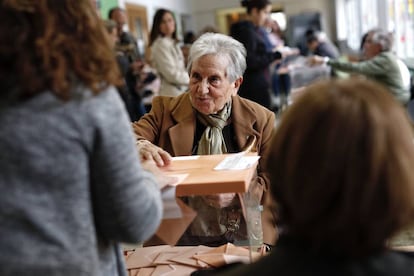Fear and fury: a divided Spain goes to the polls
The outcome of today’s general election will determine whether a far-right party, Vox, becomes a significant new presence in Spanish national politics

Spaniards are voting today in a general election where feelings of fear and fury make any outcome seem like a possibility.
There are 36.8 million eligible voters, but many of them will stay away from the polling stations. The success or failure of the left- and right-wing blocs will largely hinge on how many political abstainers decide to go vote on a clear and sunny day that provides no meteorological excuses to stay home.
For reporters on the campaign trail, it is surprising to see this much interest in a general election
Voters are more divided than ever in Spain. Fear of the ultra-nationalist Vox party has been palpable at all center-left rallies, while center-right events have been defined by the fury against Prime Minister Pedro Sánchez.
Images of Vox’s most recent rallies have fed progressive fears about the possibility of seeing the far right in government again in a country where this ideology was in power via a dictatorship until 1976, and where many people thought it had since died out.
Spanish politics is awash with real and apocryphal polls suggesting that the right-wing parties will not get enough collective seats for a majority, but nobody can be certain. And the polls showing Sánchez as the winner also feed the frustration of conservatives who want him out of government.
Ultimately, it will come down to the turnout rate and the power share between the three parties competing for leadership of Spain’s political right.
Politics is made with images, and the videos of packed Vox rallies, especially in Valencia and Madrid, have been spreading fast. The Socialist Party (PSOE) has organized some very large events. The Popular Party (PP) has made a great effort at its closing rally in Madrid’s Palacio de los Deportes. But no party has managed to attract as many people as Vox, which is headed by Santiago Abascal.

Veteran politicians note that filling venues is a lot easier than filling ballot boxes. “In the 1980s, [PP top official] Manuel Fraga would systematically fill up the Valencia bullring. But then the PSOE took twice as many votes as us,” said a PP regional leader on Friday.
These spectacular images can have a dual effect: they encourage like-minded people, but also mobilize those on the opposite end of the spectrum. Veteran PP politicians have not forgotten the largest rally in recent history: at the 1996 election campaign, the PP of José María Aznar and Eduardo Zaplana – then the all-powerful Valencia premier – managed to fill up the Mestalla soccer stadium with as many as 55,000 followers. Polls showed the conservative party in the lead by 10 to 12 percentage points.
Miguel Ángel Rodríguez, a key member of that campaign, still recalls how Aznar and his team could simply not believe the exit polls indicating that the PP was going to lose the election for the third straight time, even though the PSOE was theoretically sunk by a series of corruption scandals. “When the vote count began, we finally won by a very small margin,” he notes.
Veteran politicians note that filling venues is a lot easier than filling ballot boxes
The political guru Pedro Arriola posited at the time that the images of Mestalla full of PP fans had mobilized the leftist electorate. But Rodríguez believes it was not so much that as the charisma of PSOE leader Felipe González, who managed to make one final sprint towards the end of the campaign.
Many believe that a good number of Spaniards will go vote today out of fear of Vox. But some deny it. “The problem is precisely that Vox is not scary enough. Le Pen and Salvini are scary. But Vox is too ridiculous. We don’t believe them. We laugh at them. They are the political embodiment of landismo,” says one veteran PP leader, alluding to Alfredo Landa, a popular Spanish actor who made comedies in the 1970s. “And therein lies the tragedy. Because perhaps that is exactly what makes them more dangerous.”
The campaign has served many purposes. Everything seems to indicate that voters have been mobilized; there were two televised debates with record audience shares, and these allowed the new parties Podemos and Ciudadanos to climb up within their respective blocs.
For reporters on the campaign trail, it is surprising to see so much interest in a general election. Everywhere, people are talking politics, speculating, debating. An elderly couple out for an evening walk in Valencia were overheard arguing about who is more responsible for the rise of Vox, whether the right or the left. At noon at Barajas airport in Madrid, four executives watch a cellphone video of a Vox rally where the speaker cracks a joke about the leaders of the PSOE and Podemos. Two of the execs laugh their heads off, the other two are incensed.
In these final hours, Spain looks like something out of the last scene in Thesis, Alejandro Amenábar’s debut horror movie. In the scene, all the hospital patients are watching a snuff movie on their screens, apparently mesmerized by what they are seeing. Vox has had the same hypnotic effect in the most bizarre campaign seen in recent years. Nobody can stop looking. It remains to be seen whether Vox will achieve just that – an apprehensive fascination on social media – or whether the party is here to stay in Spanish politics. Voters have the last word.
English version by Susana Urra.
Tu suscripción se está usando en otro dispositivo
¿Quieres añadir otro usuario a tu suscripción?
Si continúas leyendo en este dispositivo, no se podrá leer en el otro.
FlechaTu suscripción se está usando en otro dispositivo y solo puedes acceder a EL PAÍS desde un dispositivo a la vez.
Si quieres compartir tu cuenta, cambia tu suscripción a la modalidad Premium, así podrás añadir otro usuario. Cada uno accederá con su propia cuenta de email, lo que os permitirá personalizar vuestra experiencia en EL PAÍS.
¿Tienes una suscripción de empresa? Accede aquí para contratar más cuentas.
En el caso de no saber quién está usando tu cuenta, te recomendamos cambiar tu contraseña aquí.
Si decides continuar compartiendo tu cuenta, este mensaje se mostrará en tu dispositivo y en el de la otra persona que está usando tu cuenta de forma indefinida, afectando a tu experiencia de lectura. Puedes consultar aquí los términos y condiciones de la suscripción digital.









































